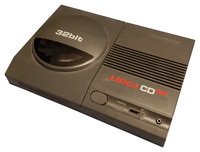Commodore Amiga CD32
| Home > Browse Our Collection > Games Consoles > Commodore > Commodore Amiga CD32 |
|
The (Commodore) Amiga CD32 was the first 32-bit CD-ROM based video game console release in Western Europe and Canada. It was first announced at the Science Museum in London, United Kingdom on 16th July 1993, and was released in September 1993. The CD32 is based on Commodore’s Advanced Graphics Architecture Chipset, and is similar specification to the Amiga 1200 computer. The CD32 was released in Canada and was planned for release in the United States. However, a deadline was reached for Commodore to pay a patent royalty to Cad Track for their use of their XOR patent. A federal judge ordered an injunction against Commodore preventing them from importing anything into the United States, Commodore had built up CD32 inventory in their Philippine manufacturing facility for the United States launch, but, being unable to sell the consoles, they remained in the Philippines until the debts owed to the owners of the Facility were Settled. In 1993, 109 CD32’s were installed to run the exhibits at the London Transport Museum, Covent Garden; they provided information, animations, pictures, sound and text available in several languages, as well as a London Underground simulator. The systems were produced by Odiham, A Hampshire based company index information, utilising their CD32x interface units. At the launch, the CD32 was bundled with two Games, Diggers, a new game Millennium Interactive, and Oscar from Flair. A later pack included one-n-one fighting game Dangerous Streets, a move by commodore that was met with derision by the Press. Many reviewers had given Dangerous Streets terrible scores and were surprised that with a slew of powerful rival consoles about to hit the market, Commodore would choose to show off the abilities of its machine with a poor game. Like all later Amiga computers, the CD32 has a hidden boot menu that can be accessed by plugging in a Amiga Mouse into port 2 and holding both buttons down while turning the system on. Sadly Commodore as a company had been mis managed for the best part of a decade, and despite healthy sales of computers, and the CD32, the company was liquidated in 1994, ending the life of the machine. CPU – Motorola 68EC020 at 14.3 MHz
For general interest the following notes have been sent to us by Stephen Harvey: Incidentally, the Amiga CD32 console is upgradable to a full personal computer by the addition of a compatible keyboard, mouse and floppy drive. This would give it the same functionality as the Amiga 1200, and full compatibility with A1200 software. A hard drive expansion is also available for the CD32 (and all other Amigas). The WinUAE emulator also supports CD32 games (as well as CDTV), and is still being actively developed. Performance and compatibility is very good when it's correctly configured, even on a slower PC. I'd recommend 1.6 GHz minimum for A1200/CD32 game emulation. Manufacturer: Commodore Comment on This Page Catalogues RELATED to Commodore Amiga CD32 in our Library
Other Systems Related To Commodore Amiga CD32:This exhibit has a reference ID of CH4583. Please quote this reference ID in any communication with the Centre for Computing History. |
Click on the Image(s) For Detail
|













